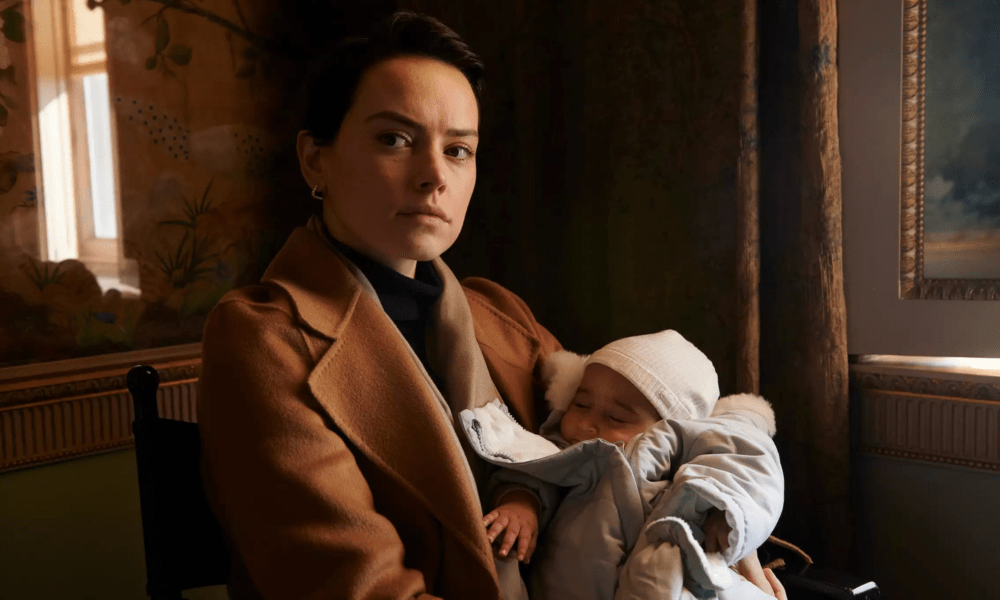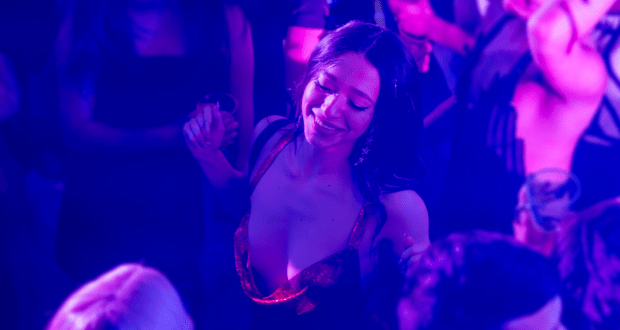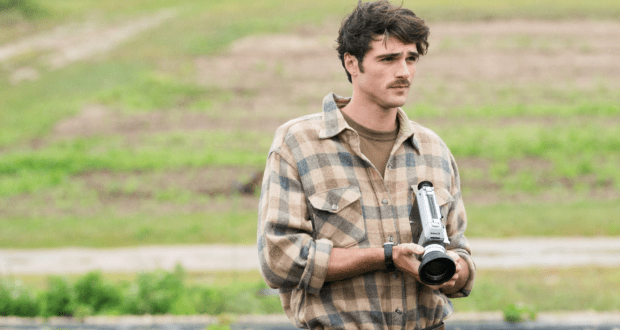Sam Yates’ Magpie swoops into the neo-noir genre with a sharp, melancholic edge, presenting a story of love, obsession, and misplaced priorities. With Daisy Ridley as the beguiling Anette and Shazad Latif as the morally conflicted Ben, the film straddles the line between noir tropes and modern-day emotional disarray. Yates crafts a visually arresting world where shadows deepen secrets, and a father’s innocent chaperone duties morph into something far more sinister. But does Magpie soar or simply flap around in familiar territory?
Premise:
At its core, Magpie is a slow-burn descent into emotional chaos. Ben (Latif) is a new father, clearly overwhelmed by his roles as husband, father, and now temporary overseer of his daughter’s burgeoning acting career. When his precocious child lands a role alongside Anette (Ridley), a world-famous actress with an aura of mystery and allure, Ben is thrust into a setting where reality often blurs with fiction.
While initially hesitant, Ben is drawn to Anette’s intoxicating blend of confidence and vulnerability. She, in turn, notices the quiet man in the corner who sees her beyond the glitz. What begins as admiration quickly spirals into infatuation, as Ben’s domestic responsibilities take a backseat to his escalating obsession. This duality—Anette’s charm versus Ben’s unraveling—forms the emotional heart of the film, though the story occasionally veers into predictability.
Writing:
Yates’ script captures the fragmented psyche of a man trapped between two worlds. However, the pacing wavers, particularly in the second act, where the repetition of longing glances and cryptic exchanges makes the narrative feel slightly overwrought. The payoff, while thematically rich, leaves room for more daring choices.
Ridley and Latif work well off each other:
Daisy Ridley’s portrayal of Anette is magnetic. She exudes old-Hollywood glamor with a contemporary edge, her performance laced with layers of insecurity and agency. Anette is both a star and a person undone by the very spotlight she commands. Ridley makes her simultaneously enigmatic and relatable, never tipping too far into stereotype.
On the other hand, Shazad Latif shoulders the weight of Ben’s crumbling facade with a nuanced performance. His Ben is a man teetering on the edge, wrestling with guilt, desire, and the gnawing realization of his own inadequacies. Latif’s restrained approach grounds the character, though one might argue his arc could use a few more moments of catharsis.
Their chemistry is deliberate and simmering, but it’s not fireworks—it’s a quiet, lingering tension. Their dynamic is more about what isn’t said, the weight of pauses and stolen looks. This restrained approach works for the film’s neo-noir leanings but may leave some viewers yearning for a bit more emotional volatility.
Cinematography:
Cinematographer Laura Bellingham employs a palette of muted tones punctuated by stark contrasts, echoing the internal dichotomy of its characters. The play of light and shadow is deliberate, a nod to the genre’s roots. Whether it’s the sterile brightness of the film set or the dusky intimacy of late-night conversations, the visual language of Magpie amplifies its themes of duplicity and longing.
The setting—a secluded coastal town that hosts the film’s production—feels both vast and isolating. It’s a character in itself, its windswept beaches and empty cafes mirroring Ben’s sense of detachment. The production design smartly juxtaposes the artificiality of the film industry against the raw, unfiltered emotions of its characters.
Themes:
What elevates Magpie is its thematic ambition. This is a film about yearning—for love, for freedom, for a sense of identity. Ben’s fixation on Anette isn’t just about her; it’s a projection of his own dissatisfaction. Anette, for her part, is acutely aware of the power dynamics at play and wields them with both caution and recklessness.
The film also interrogates the performative nature of relationships. Just as Anette plays a part on-screen, so too does Ben in his marriage. His growing infidelity—emotional and otherwise—is framed not as a betrayal of his wife but as a failure of self-awareness. Yates doesn’t excuse his actions, but he humanizes them, leaving the audience uncomfortably complicit in Ben’s decisions.
However, the script occasionally falters in fully unpacking these themes. Subplots involving Ben’s wife and daughter feel underdeveloped, leaving their emotional stakes muted. The exploration of Anette’s struggles with fame offers intriguing glimpses but doesn’t delve deep enough to feel revelatory.
Neo-noir elements:
As a neo-noir, Magpie checks many of the genre’s boxes. There’s an air of fatalism that permeates the film, a sense that no one escapes unscathed. The femme fatale trope is subverted through Anette’s layered characterization, while Ben’s descent mirrors the classic noir protagonist—flawed, desperate, and doomed by his own choices.
Yet, the film stops short of fully embracing its noir roots. The tension, while palpable, rarely escalates to the point of true dread or danger. The stakes remain mostly internal, which may disappoint those expecting more overt thrills.
Overall:
Magpie is an alluring, if uneven, exploration of love and obsession, brought to life by strong performances and evocative visuals. While it doesn’t entirely escape the shadow of its influences, it offers enough intrigue and emotional resonance to justify its perch. Like its titular bird, the film is drawn to shiny things—sometimes at the expense of substance—but it’s a captivating watch nonetheless.
-
Acting - 7.5/10
7.5/10
-
Cinematography/Visual Effects - 7/10
7/10
-
Plot/Screenplay - 6.5/10
6.5/10
-
Setting/Theme - 6.5/10
6.5/10
-
Watchability - 7/10
7/10
-
Rewatchability - 4.5/10
4.5/10













